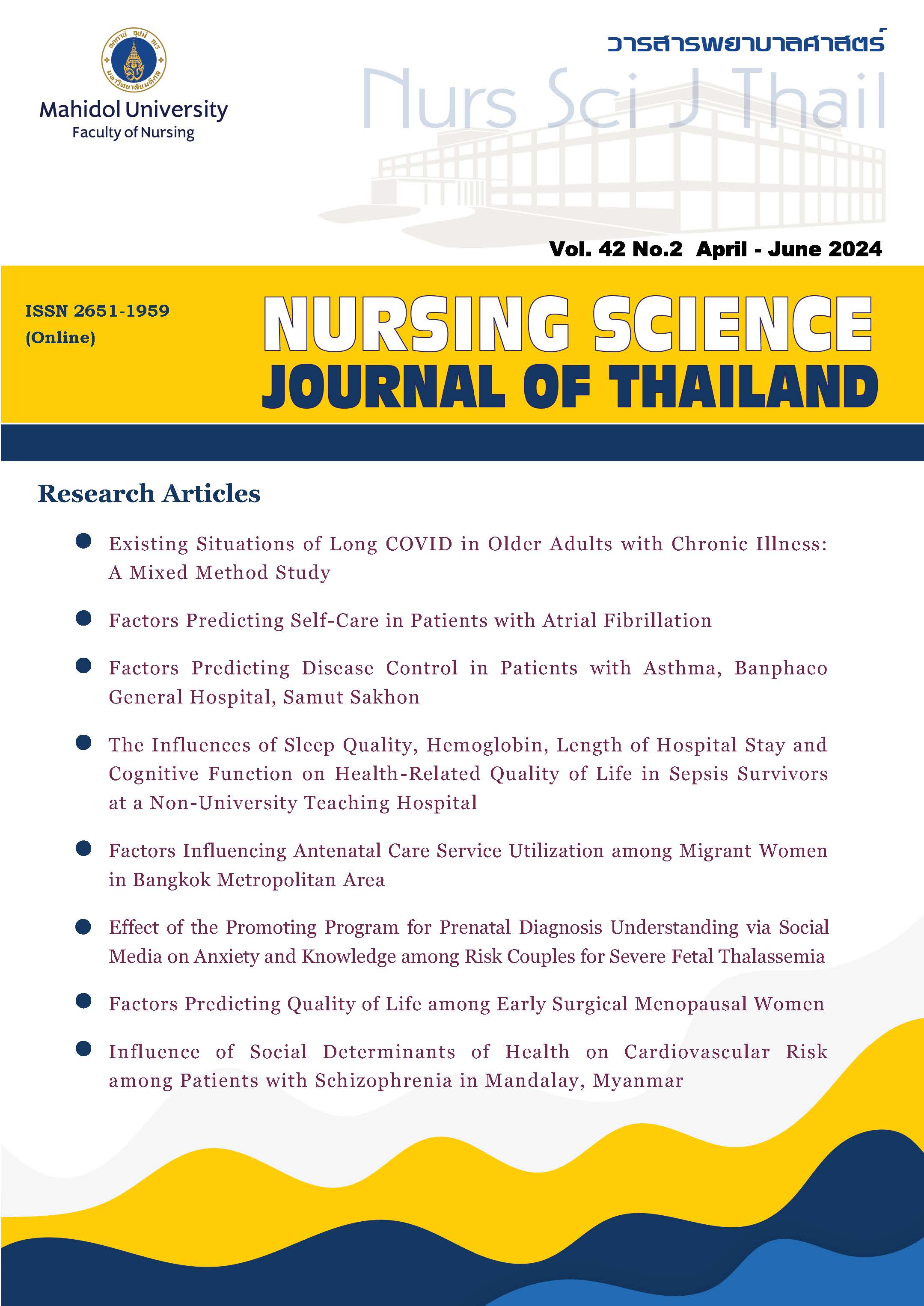Effect of the Promoting Program for Prenatal Diagnosis Understanding via Social Media on Anxiety and Knowledge among Risk Couples for Severe Fetal Thalassemia
Main Article Content
Abstract
Purpose: o study the effect of the promoting program for prenatal diagnosis understanding via social media on anxiety and knowledge among risk couples for severe fetal thalassemia.
Design: Experimental study.
Methods: The subjects were pregnant women and their husbands, who were diagnosed as couples at risk of having a baby with severe thalassemia. There were 61 couples who received antenatal care services at two university hospitals (31 pairs of experimental group and 30 pairs of control group). The instruments used for data collection included the State Anxiety Inventory Form X-1, and the Knowledge of Thalassemia and Preparation before the Prenatal Diagnosis. ata were analyzed by independent t-test, paired sample t-test, Mann-Whitney test, and Wilcoxon signed-rank test.
Main findings: The promoting program for prenatal diagnosis understanding via social media could significantly reduce anxiety among pregnant women and their husbands (p < .05) and significantly increase knowledge in pregnant women (p = .001).
Conclusion and recommendations: The promoting program for prenatal diagnosis understanding via social media can be used to reduce anxiety and increase knowledge among pregnant women and husbands who are at risk of having severe fetal thalassemia. The study findings suggest that nurses and midwives should apply this program as a practice guideline to care for couples at risk of having fetal thalassemia with closely monitoring via assessment forms and online applications.
Article Details

This work is licensed under a Creative Commons Attribution-NonCommercial-NoDerivatives 4.0 International License.
Copyright Notice: Nursing Science Journal of Thailand has exclusive rights to publish and distribute the manuscript and all contents therein. Without the journal’s permission, the dissemination of the manuscript in another journal or online, and the reproduction of the manuscript for non-educational purpose are prohibited.

Disclaimer: The opinion expressed and figures provided in this journal, NSJT, are the sole responsibility of the authors. The editorial board bears no responsibility in this regard.
References
Paiboonsukwong K, Jopang Y, Winichagoon P, Fucharoen S. Thalassemia in Thailand. Hemoglobin. 2022;46(1):53-7. doi: 10.1080/03630269.2022.2025824.
Thongsong T, Wanapirak C. Hematological diseases in pregnant women. In: Thongsong T, editor. Obstetrics. 6th ed. Bangkok: Laksameerung; 2021. p.745-60. (in Thai).
Busabawalai T, Poonchai K, Thanuchit S, Onjorn O, Malathong N, Chuenchom S, et al. Complete research report project evaluation and control of thalassemia blood plants in pregnant women. Nonthaburi: Health Intervention and Technology Assessment Program; 2019. 115 p. (in Thai).
World Health Organization. EB118.R1 Thalassemia and other hemoglobinopathies - Item 5.2 of the Agenda (Documents EB118/5 and EB118/5 Add.1). In: WHO, Executive Board, 118th Session, Geneva, 29-31 May 2006 - Resolutions and decisions, annexes, summary records. Geneva: World Health Organization; 2006. p.63-4, 144-8. Available from: http://apps.who.int/gb/ebwha/pdf_files/EBSS-EB118-2006-REC1/english/Res/res-eb118_2006_ rec1-en.pdf.
Mensah C, Sheth S. Optimal strategies for carrier screening and prenatal diagnosis of α-and β-thalassemia. Hematology Am Soc Hemato Educ Program. 2021;2021(1):607-13. doi: 10.1182/hematology.2021000296.
Aziz MA, Khan WA, Banu B, Das SA, Sadiya S, Begum S. Prenatal diagnosis and screening of thalassemia mutations in Bangladesh: presence of rare mutations. Hemoglobin. 2020;44(6):397-401. doi: 10.1080/03630269.2020.1830797.
Chuenwattana P, Yusamran C. Invasive prenatal diagnosis of thalassemia: principle and nursing care. Nursing Science Journal of Thailand. 2017;35(3):4-13. (in Thai).
Atienza-Carrasco J, Linares-Abad M, Padilla-Ruiz M, Morales-Gil IM. Breaking bad news to antenatal patients with strategies to lessen the pain: a qualitative study. Reprod Health. 2018;15:11. doi: 10.1186/s12978-018-0454-2.
Srisutthikamol N, Sripichyakan K, Baosoung C, Klunklin P. Refining woman-centered care in prenatal screening and diagnosis for thalassemia: a qualitative descriptive study among northeastern Thai women. Pac Rim Int J Nurs Res. 2021;25(3):389-406.
Moudi Z, Jam R, Ansari H, Montazer Zohour M. Effect of shared decision-making on anxiety of women recommended for prenatal screening tests in southeast of Iran. J Family Reprod Health. 2020;14(3):192-7. doi: 10.18502/jfrh.v14i3.4673.
Thain E, Shuman C, Miller K, Sappleton K, Myles-Reid D, Chitayat D, et al. Prenatal and preconception genetic counseling for consanguinity: consanguineous couples' expectations, experiences, and perspectives. J Genet Couns. 2019;28(5):982-92. doi: 10.1002/jgc4.1150.
Yeşilçinar İ, Güvenç G. Counselling and education for prenatal screening and diagnostic tests for pregnant women: randomized controlled trial. Int J Nurs Pract. 2021;27(5):e13000. doi: 10.1111/ijn.13000.
Lindgren P, Stadin M, Blomberg I, Nordin K, Sahlgren H, Ingvoldstad Malmgren C. Information about first-trimester screening and self-reported distress among pregnant women and partners - comparing two methods of information giving in Sweden. Acta Obstet Gynecol Scand. 2017;96(10):1243-50. doi: 10.1111/aogs.13195.
Thanthitithanakun B, Duphaskul S. Health believes model on post-Covid-19 information during digital transformation. Journal of MCU Ubon Review. 2022;7(3):487-502. (in Thai).
Swanson KM. Kristen Swanson’s theory of caring. In: Smith MC, Parker ME, editors. Nursing theories and nursing practice. 4th ed. Philadelphia, PA: F. A. Davis Company; 2015. p.521-31.
Klaitabtim B, Yusamran C, Sinsuksai N. Effect of an information support program on anxiety in advanced maternal-age women receiving amniocentesis. Journal of Nursing and Health Care. 2016;34(3):81-7. (in Thai).
Kochapakdee N, Worakitpokathorn S, Nissaisuk M. The anxiety scale [copies of documents]. Bangkok: Mahidol University; 1988. (in Thai).
Raungrongmorakot K, Puapornpong P, Rattanamongkolgul S. Knowledge, attitudes and practice of premarital, preconceptional blood tests and thalassemia among pregnant women and their spouses during the first prenatal visit. Journal of Medicine and Health Sciences. 2012;19(2):22-8. (in Thai).


